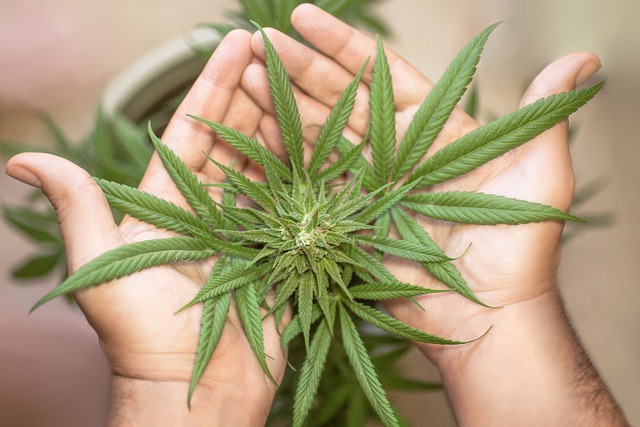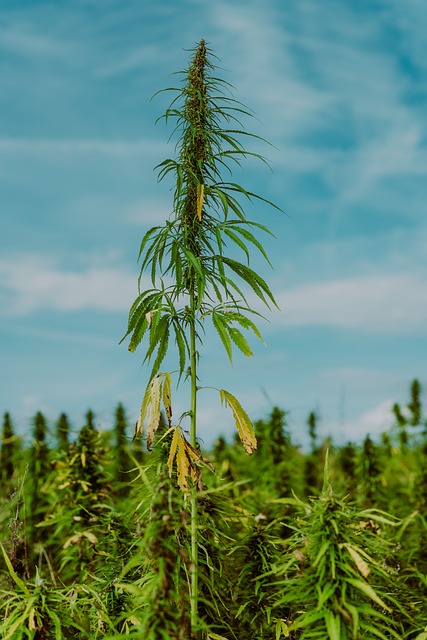THCA buds, a non-psychoactive compound found in raw cannabis, are being explored for their potential to treat sleep disorders. Unlike its psychoactive counterpart THC, THCA interacts with the endocannabinoid system's CB1 and CB2 receptors without causing a high, which may help regulate sleep patterns and promote relaxation. Studies suggest that THCA can support restful sleep by influencing neurotransmitters that affect mood and pain sensation, which are key to healthy sleep cycles. Additionally, its engagement with CB2 receptors could offer broader health benefits. The presence of myrcene, a terpene with sedative qualities, may enhance the effects of THCA, making it a promising natural alternative for those looking to improve their sleep without resorting to traditional pharmaceuticals. As research continues, THCA buds are gaining attention as a potential therapeutic option for managing sleep disorders, offering a new avenue in cannabinoid treatment plans. The emerging evidence highlights the importance of further investigation into the benefits of THCA for enhancing overall sleep health.
Discover the transformative potential of THCA buds in enhancing sleep quality. This article delves into the role of these natural compounds in addressing sleep disorders, offering a comprehensive look at their therapeutic properties. Unlock the secrets behind THCA buds for sleep disorders and learn how they can contribute to more restful nights and rejuvenated mornings. Join us as we explore the science and benefits of THCA flower, setting the stage for better understanding of its impact on sleep health.
- Understanding THCA Buds and Their Role in Addressing Sleep Disorders
- Exploring the Therapeutic Properties of THCA Flower for Improved Sleep Quality
Understanding THCA Buds and Their Role in Addressing Sleep Disorders

THCA, or tetrahydrocannabinolic acid, is a non-psychoactive cannabinoid found in the raw cannabis plant that has garnered attention for its potential therapeutic properties. When heated, THCA converts to THC, the primary psychoactive component of cannabis. However, in its natural state, THCA exhibits distinct characteristics and health benefits. One such benefit is its potential role in addressing sleep disorders. Studies suggest that THCA buds may interact with the body’s endocannabinoid system, influencing sleep patterns and promoting relaxation without the psychoactive effects associated with THC. This makes them a particularly attractive option for individuals seeking natural alternatives to treat sleep disturbances, such as insomnia.
The efficacy of THCA buds for sleep disorders is rooted in their ability to modulate the CB1 and CB2 receptors within the endocannabinoid system. The CB1 receptors are predominantly located in the brain and are responsible for regulating neurotransmitters that affect mood, motor skills, pain sensation, and sleep, among other functions. By engaging these receptors, THCA may help alleviate insomnia by promoting a state of calm and relaxation that is conducive to sleep. Additionally, THCA’s interaction with the CB2 receptors, which are involved in regulating immune responses, suggests a broader range of benefits for overall health and well-being. For those experiencing sleep disturbances, incorporating THCA buds into their nightly routine may offer a natural pathway to improved sleep quality. However, it is important for individuals to consult with healthcare professionals before incorporating any cannabinoid products into their wellness regimen.
Exploring the Therapeutic Properties of THCA Flower for Improved Sleep Quality

THCA, or tetrahydrocannabinolic acid, is a non-psychoactive cannabinoid found in the unheated buds of the cannabis plant. As research continues to uncover its potential benefits, one area of interest is the therapeutic properties of THCA buds for sleep disorders. Preliminary studies suggest that THCA may interact with the body’s endocannabinoid system, influencing sleep patterns without the psychoactive effects associated with its decarboxylated form, THC. Individuals seeking natural alternatives to conventional sleep aids might find promise in THCA’s potential to promote restful sleep. Its effect on sleep quality could be attributed to its ability to reduce anxiety and pain, common obstacles to achieving deep, restorative rest. Additionally, the presence of myrcene, a terpene also found in hops and lemongrass, is thought to enhance THCA’s sedative effects, further supporting the body’s natural sleep cycle. As interest in cannabinoid therapy grows, understanding how THCA buds for sleep disorders can be incorporated into treatment plans is becoming increasingly important for those suffering from insomnia and other sleep-related issues. With ongoing clinical trials and studies, the potential of THCA as a non-intoxicating sleep aid is an exciting development in the field of cannabinoid research.
THCA buds have emerged as a promising natural alternative for individuals experiencing sleep disturbances. The therapeutic properties of these cannabinoid-rich flowers offer a potential solution to improve sleep quality, as delved into in this article. By understanding the role of THCA buds in addressing sleep disorders, we can appreciate their potential in promoting restful slumber and enhancing overall wellbeing. As research continues to evolve, the benefits of incorporating THCA buds for sleep disorders become increasingly clear, suggesting a natural pathway towards better rest.
